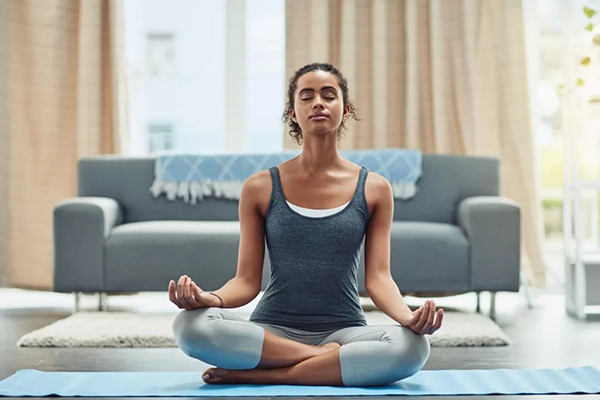Meditation has long been celebrated as a powerful tool for fostering relaxation, mindfulness, and inner peace. However, among the myriad benefits attributed to this ancient practice, one question arises: Can meditation potentially influence physical stature, particularly height? Today, we embark on an exploration to uncover the facts, debunk any myths, and gain a deeper understanding.
What is meditation?
Meditation is a mental practice where you train your mind to focus and become more aware. It helps you relax deeply and be more mindful of your thoughts and emotions. People have been doing meditation for thousands of years as part of spiritual and religious traditions. Nowadays, it’s also popular as a way to improve mental and emotional well-being, even without any specific religious beliefs.
During meditation, people find a quiet and comfortable place to sit or lie down. They then concentrate their attention on a specific object, thought, or breath, or simply observe their thoughts and feelings without judgment. The goal is to achieve a state of mental clarity and inner stillness, allowing the mind to let go of distractions and unnecessary stress.
Meditation is not about emptying the mind of thoughts; instead, it involves acknowledging thoughts and gently returning focus to the chosen point of concentration. With regular practice, meditation can lead to reduced stress, increased self-awareness, improved emotional regulation, enhanced focus, and a sense of inner peace and well-being.

What are the benefits of regular meditation?
Regular meditation offers numerous benefits for both the mind and body. Some of the key advantages include:
- Stress Reduction: Meditation activates the body’s relaxation response, which helps counteract the “fight or flight” response associated with stress. By calming the nervous system, meditation reduces the physiological and psychological effects of stress, leading to a sense of tranquility and well-being.
- Improved Focus and Concentration: Different meditation techniques, such as mindfulness and focused-attention meditation, train the mind to concentrate on a specific object, thought, or breath. This practice enhances cognitive control and allows individuals to sustain focus for more extended periods, leading to improved productivity and task performance.
- Emotional Well-being: Regular meditation fosters emotional resilience by encouraging non-reactivity to negative emotions and reducing rumination. As a result, individuals may experience fewer mood swings, increased emotional stability, and a greater sense of contentment.
- Enhanced Self-awareness: Meditation cultivates self-awareness by encouraging individuals to observe their thoughts and emotions without judgment. This heightened awareness helps recognize harmful thought patterns and behaviors, making it easier to implement positive changes in life.
- Better Sleep: Mindfulness meditation, in particular, has been shown to be effective in reducing insomnia and promoting better sleep quality. By letting go of racing thoughts and relaxing the body, individuals can find it easier to fall asleep and stay asleep throughout the night.
- Strengthened Immune System: Meditation’s stress-reducing effects indirectly support the immune system, as chronic stress can weaken immune responses. With reduced stress, the body can function optimally and maintain a robust immune defense.
- Lower Blood Pressure: Certain meditation techniques, such as transcendental meditation and mindfulness-based stress reduction (MBSR), have been linked to reductions in blood pressure. This is beneficial for cardiovascular health and reduces the risk of heart-related issues.
- Pain Management: Meditation can alter the brain’s perception of pain by modulating neural pathways involved in pain processing. This can lead to decreased pain sensitivity and improved pain tolerance, helping individuals cope with chronic pain conditions.
- Increased Compassion and Empathy: Loving-kindness meditation, or metta meditation, is particularly effective in cultivating feelings of compassion and empathy. It involves sending well-wishes and love to oneself and others, fostering a more positive and caring outlook on life.
- Improved Memory and Cognitive Function: Meditation practices that involve focused attention and mindfulness can positively impact brain areas responsible for memory and cognitive function. As a result, individuals may experience better memory retention, increased cognitive flexibility, and improved decision-making abilities.
- Enhanced Creativity: Open-monitoring meditation, a type of mindfulness practice, allows the mind to explore thoughts and sensations without judgment. This mental flexibility and openness can foster creativity and innovative thinking.
Can meditation make you taller?
The relationship between meditation and height is not a direct one, and scientific evidence on this specific aspect is limited. Meditation is primarily known for its positive effects on mental and emotional well-being, stress reduction, and relaxation.
Height is known to be primarily determined by genetic factors and growth during childhood and adolescence. Factors, like nutrition, exercise, and overall health, play more significant roles in a person’s growth and development. A balanced diet, proper exercise, and maintaining a healthy lifestyle are essential for promoting growth during these formative years.
However, meditation can indirectly impact one’s overall health and well-being, which might contribute to a healthier growth and development process. By reducing stress and promoting relaxation, meditation can help with hormone regulation, sleep quality, and overall body function, which may play a supporting role in general health and potentially contribute to optimal growth.

Is there a right or wrong way to meditate?
There is no definitive “right” or “wrong” way to meditate. Meditation is a highly personal practice, and what works for one individual may not work for another. The beauty of meditation lies in its flexibility and adaptability to suit different preferences and needs.
Although there are various meditation techniques and styles, the essence of meditation is about cultivating mindfulness, inner stillness, and a sense of presence. Whether you choose to focus on your breath, repeat a mantra, engage in guided meditation, or practice loving-kindness meditation, the goal is to find a method that resonates with you and allows you to experience a sense of calm and awareness.
The key to successful meditation is consistency and finding a practice that feels comfortable and sustainable for you. It’s natural to have thoughts arise during meditation, and it’s not about trying to suppress them. Instead, acknowledge those thoughts without judgment and gently bring your focus back to your chosen point of meditation.
Remember that meditation is not a competition or a performance; there is no “right” way to do it. It’s a journey of self-discovery and self-awareness, and there is no need to compare your meditation experience with others. The most important aspect is to approach meditation with an open mind, be patient with yourself, and allow the practice to evolve.
How can I start meditating?
You don’t need any special equipment or training in order to begin meditating, and it is simple to accomplish. To get started, follow these steps:
- Choose a Suitable Time: Find a time of day that works best for you. Some people prefer to meditate in the morning to set a positive tone for the day, while others find it beneficial to meditate in the evening to unwind and relax.
- Create a Calm Environment: Select a quiet and clutter-free space where you can meditate without disturbances. You may want to dim the lights or use soft, calming music or nature sounds if it helps you relax.
- Start with Short Sessions: As a beginner, it’s better to start with short meditation sessions, such as 5 to 10 minutes, to build the habit gradually. As you become more comfortable with the practice, you can gradually extend the duration.
- Choose Your Meditation Posture: There are various meditation postures you can try, such as sitting cross-legged on the floor, sitting on a chair with your feet flat on the ground, or even lying down if you find it more comfortable. The key is to maintain a straight back and relaxed body.
- Focus on Your Breath: Concentrating on your breath is a common and effective meditation technique. Feel the sensation of your breath as you inhale and exhale. Whenever your mind wanders, gently bring your focus back to your breath.
- Be Patient with Yourself: It’s normal for your mind to wander during meditation. Don’t be discouraged by this; instead, practice patience and self-compassion. Acknowledge the wandering thoughts without judgment and gently guide your attention back to the present moment.
- Use Guided Meditations: Guided meditations are excellent for beginners as they provide verbal instructions and guidance throughout the practice. You can find guided meditation sessions online, through apps, or by following meditation teachers.
- Explore Different Techniques: There are various meditation techniques, each with its unique benefits. Feel free to explore and experiment with different styles, such as mindfulness, loving-kindness, body scan, or transcendental meditation, to see what resonates with you the most.
- Make it a Habit: Consistency is key to experiencing the full benefits of meditation. Try to meditate daily, even if it’s for a short duration. Set reminders or incorporate meditation into your daily routine to make it a habit.
- Stay Open-minded: Meditation is a personal practice, and what works for one person may not work for another. Be open-minded and adaptable to find the approach that suits you best.
- Track Your Progress: Keep a journal or use a meditation app to track your progress and experiences. This can help you stay motivated and observe any positive changes in your mental and emotional well-being over time.
- Seek Guidance if Needed: If you encounter challenges or have questions about your meditation practice, don’t hesitate to seek guidance from experienced meditators, meditation teachers, or even meditation groups in your community.
In conclusion,
Meditation’s benefits in promoting relaxation, reducing stress, and improving overall well-being indirectly contribute to a healthier lifestyle, which may support optimal growth and development. While meditation offers various mental and emotional advantages, it should not be considered a direct means to increase stature. Embracing meditation for its proven positive impact on mental health and mindfulness remains valuable, while other factors, like nutrition and exercise, play more significant roles in determining one’s height.
FAQs
Are there any exercises or techniques that can increase height?
While there are no exercises or techniques that can significantly increase height after the growth plates in the bones have closed (usually around the end of puberty), maintaining good posture through exercises and stretching can help you appear taller and more confident.
Can meditation help with posture and body alignment?
Yes, meditation can indirectly assist with improving posture and body alignment. By promoting self-awareness and mindfulness, meditation can help you become more conscious of your body’s alignment and posture throughout the day. This increased awareness may lead to better posture habits.
Are there any other benefits of meditation for overall well-being?
Yes, meditation offers numerous benefits for overall well-being, including stress reduction, improved focus and concentration, enhanced emotional well-being, better sleep, and increased self-awareness. It can also promote relaxation and help manage anxiety and depression.
How often should I meditate to experience its benefits?
The frequency of meditation can vary from person to person. Consistency is more important than the duration of each session. Starting with a few minutes of daily meditation and gradually increasing the time as you become more comfortable is a good approach.
Can meditation be combined with other practices for a healthy lifestyle?
Yes, meditation complements various healthy lifestyle practices, such as regular exercise, a balanced diet, sufficient sleep, and stress management techniques. Combining meditation with other health-promoting activities can have a positive impact on overall well-being.
Is there any scientific evidence supporting the benefits of meditation?
Yes, numerous studies have demonstrated the positive effects of meditation on mental and physical health. Scientific research has shown that meditation can reduce stress, improve cognitive function, and positively influence emotional regulation, among other benefits.
Can meditation help with height-related self-esteem and confidence?
While meditation cannot change your physical height, it can help improve self-esteem and confidence by promoting self-acceptance, self-awareness, and emotional resilience. These qualities contribute to a positive self-image and overall well-being.
Are there any age restrictions for starting a meditation practice?
There are no specific age restrictions for meditation. People of all ages can benefit from meditation. However, meditation techniques and approaches may vary based on age and individual preferences.
Should I consult a healthcare professional before starting a meditation practice?
It is generally safe for most people to start a meditation practice. However, if you have any underlying medical conditions or concerns, it’s a good idea to consult a healthcare professional before beginning any new wellness practice, including meditation.
Reviewed by Deliventura
- Related post: Does testosterone affect height?

Erik Kelly with more than 30 years of working in the field of technology and games. Erik Kelly will answer all your questions related to the latest technology products, new game reviews at Timrim.com website.